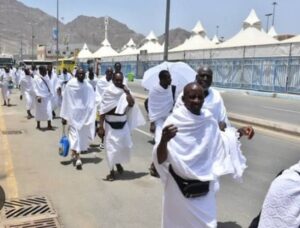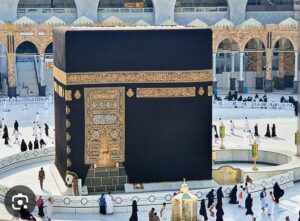


Photo credit: google.com
,,,, Lesson for Nigerian pilgrims
By Dada Ahmed
In 1996 and 2019, I had the opportunity to embark on the holy pilgrimage to Makkah and Madina in Saudi Arabia by the special grace of Almighty Allah.
It is a known fact that the pilgrimage to Makkah is one of the Five Pillars of Islam, mandatory for all Muslims who can physically and financially afford it. Hajj is not just a religious obligation; it serves as a profound demonstration of unity, peace, and love among millions of Muslims from diverse backgrounds, according to an AI language model expert.

The primary purpose of my religious journey to the holy land was to fulfill one of the Five Pillars of Islam. Secondly, as a visiting journalist, I used the opportunity to report on the activities of the National Hajj Commission of Nigeria (NAHCON) in Makkah and Madina for Nigerians and other audiences around the world.
During the two Hajj sessions that Almighty Allah enabled me to witness, the significance of Hajj to my religious undertaking and its relevance to unity, peace, and love among humanity became clear to me.
For about 30 days, I joined millions of my fellow Muslim brothers and sisters in Makkah and Madina to observe all the prescribed rituals marking the religious exercise. This experience heightened my awareness of the unity of Hajj, the equality of man before Almighty Allah, and the importance of having a common purpose and vision with my neighbors.
Additionally, I learned valuable lessons from the peaceful nature of the Hajj exercise and the need to apply them in my relationships with others in society, without borders. I returned to Nigeria after a fulfilling pilgrimage with a deep sense of reconciliation, forgiveness, charity, and generosity towards my fellow humans, besides fulfilling one of the Five Pillars of Islam.
As Nigerian Muslim pilgrims begin their return journey home with the 2024 Hajj gradually winding down, it is essential to remind them of the imperative of imbibing the lessons from Hajj to boost concerted efforts towards making Nigeria’s overall development a reality.
No doubt, Nigeria requires the input of her citizens who attended the 2024 Hajj pilgrimage. The expectation is that these pilgrims will leverage the valuable lessons from the principles exemplified during Hajj to help the government find lasting solutions to ethnic, religious, and other challenges hampering the process of fostering unity, peace, and love in the country.
Experience shows that Nigerian pilgrims undertook rituals such as Tawaf (circling the Kaaba) and Sa’i (walking between the hills of Safa and Marwah) alongside their counterparts. The sense of common purpose and shared experience these exercises reinforced can be harnessed to forge common goals, foster love, and build the much-needed unity for the country’s growth and development.
Concerned Nigerians believe that the country is in dire need of enhancing unity by fostering national programs aimed at engaging citizens in collective activities for common goals, such as community service, national sports,among others inclusive programmes. This is an area where Muslim pilgrims, upon returning from the 2024 Hajj, are expected to play their role.
In a country such as Nigeria, where statistics show a rising poverty rate, extending hands of fellowship by the pilgrims, in terms of charity and generosity, becomes imperative. Acts of charity are integral to Hajj and Islam, a religion of peace, where pilgrims often give to those in need. Therefore, these pilgrims can join other patriotic Nigerians to enhance social cohesion by supporting charitable organizations, encouraging volunteerism, and supporting the government to implement policies that address poverty and social inequality.
It is instructive to note that Hajj encourages reconciliation and the seeking of forgiveness from others. Pilgrims are advised to integrate this practice into their dealings, not only among themselves but with other Nigerians through various initiatives that encourage forgiveness and heal historical wounds. This approach can significantly mitigate violence and other negative tendencies hindering Nigeria’s progress.
In the final analysis, the principles of unity, peace, and love exemplified during Hajj offer valuable lessons for Nigerian pilgrims and Muslims in general. By embracing these principles and helping the government integrate them into national policies and social practices, Nigerians can portray a more united, peaceful, and loving society.
Apart from the tremendous religious benefits derived from performing Hajj, the experience of this holy exercise also serves as a reminder that despite our differences, we are all equal before Almighty Allah and capable of uniting for a common cause.
Various clerics, in their preachings and sermons to the Nigerians pilgrims in Makkah and Madina, stressed the need for them to imbibe the lessons of the Hajj when back at home to ensure the unity of Nigeria.
It is hoped, with prayer, that the lessons derived by the 2024 Hajj pilgrims will be utilized to guide Nigeria towards a brighter, more harmonious, and prosperous future.
Meanwhile,1,452 Nigerian pilgrims on Flynas flight XY9002, departed Jeddah International Airport to Lagos @13:52hrs on June 23,2024 with 188 Lagos pilgrims and 35 officials,according to NAHCON’S Command and Control Centre (Makkah) as at the time of this publication.
Dada Ahmed publishes The Reporters.


